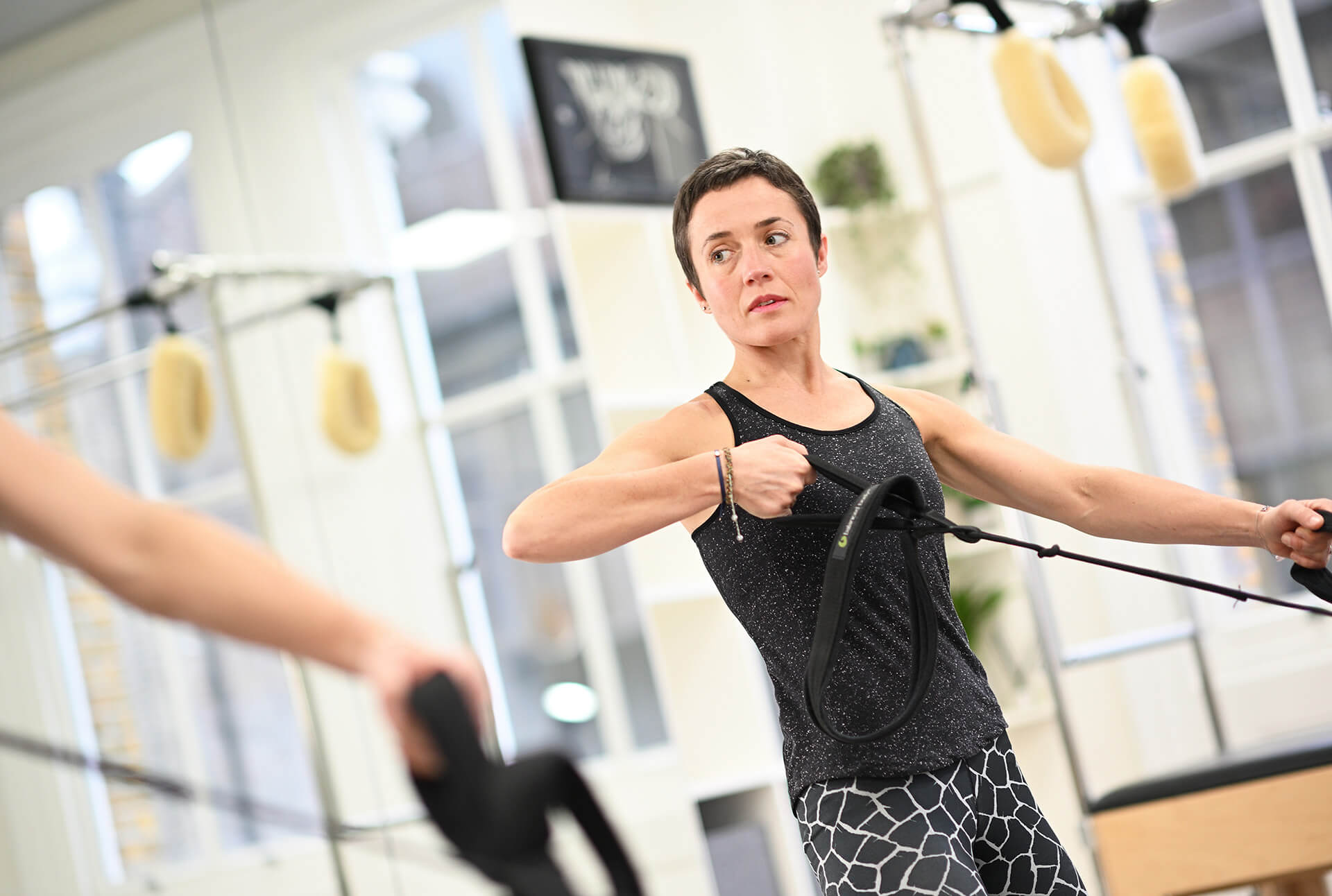Have you just started a rehabilitation programme and been asked about what your goals are? Do you have difficulty knowing the answer? Have you ever had to set goals before? Are you someone who struggles to feel motivated with exercise? This article may just help!
Here at Complete Pilates we aim to help you set goals for your rehabilitation and movement journeys. However, this can be surprisingly hard to do.
You might feel tempted to ask someone else for advice or even have arrived at Pilates on the recommendation of a friend…. but it’s important that you are at the centre of the goal setting process. Goals should be yours and nobody else’s! With that in mind, we wrote this piece to help you, our clients, with this process.
Why bother to set goals?
There are lots of reasons for to set goals for rehabilitation and training – here are just a few:
- To give focus, direction and purpose.
- To have something to progress towards.
- To help you know when you are progressing.
- To keep you motivated.
- To help you be able to live the life you want.
- To give you ownership of your rehabilitation or movement journey.
- To improve confidence through achievement.
- To know when you have finished your rehabilitation!
- To have something to celebrate!
How to set goals?
Have a system
There are many different systems for setting goals but the most commonly known method is the SMART method. You may find that other systems work for you better but the most important thing is that you have an effective goal setting method. We’ll discuss SMART goals in more detail later.
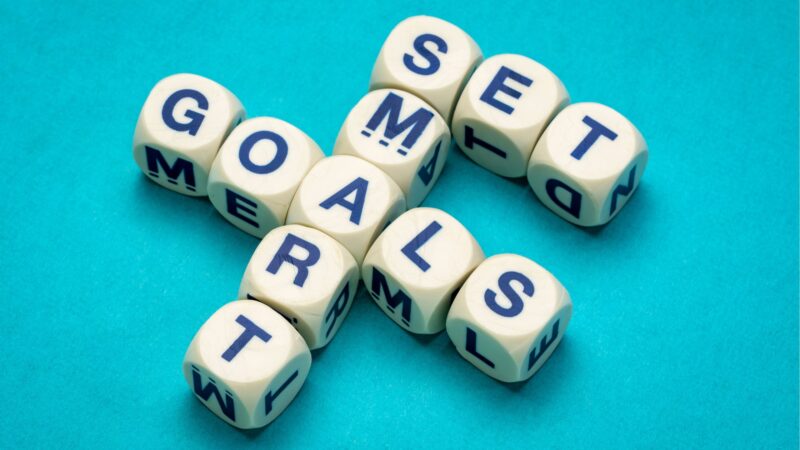
Write your goals down
Writing your goals down means that you are more likely to remember them, you can refer back to them as needed, and it increases your commitment to your goal. Research shows that goals that are written down are more likely to be achieved.
Involve others
Tell someone about your goal. Telling other people can be a great way to keep yourself accountable to your goals. However, you should choose wisely with this one – make sure you have a supportive encourager on your side!
Prioritise your goals
Having too many goals, and not knowing which is the most important, can make it difficult to succeed. Work out what is most important to you and set goals according to your priorities.
Goal Setting Systems: Setting SMART goals
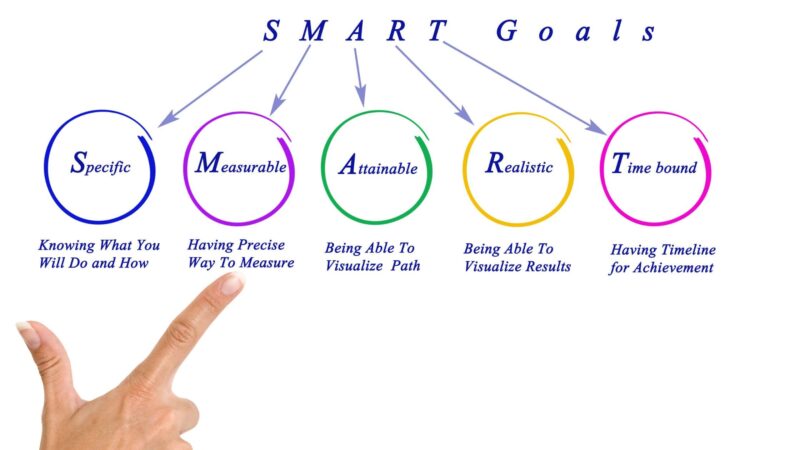
Framing goals in a concrete way is more likely to lead to success. SMART goals are a well-known tool that help to turn our aims in to practicable steps. SMART is an acronym which stands for specific, measurable, achievable, realistic and time-bound. It was originally conceived as business tool but has been adopted for many other settings.
Specific
We often have more vague ideas of what our desired outcome should be. For example, if you have a goal to get stronger, this may mean different things to different people. For some it may mean increasing their muscle bulk, for others it may mean being able to lift heavy weights or do a press up.
For other people it might be more about being able to do day to day tasks such as lift heavy saucepans, plant pots, or being able to get out of the bath.
Thinking about what strength means to you, will help you to be more specific about your strength goal.
Measurable
Having a measurable goal means that you can track your progress against your goal and know when you have completed your goal. The following are ways you can measure physical tasks: counting a number of repetitions, timing how long you can do something for, being able to do a specific named activity or task that you couldn’t do before, reducing the rating of your pain on a scale from 0 – 10, counting the number of days or weeks between painful episodes.
Without a measurable outcome, it can be difficult to know whether you are making progress and this can make it harder to stay motivated.
Achievable
The perfect goal is a goal that is neither too easy nor too hard. Setting yourself a goal that is too easy and requires little effort, does not produce the same kind of motivation as one that takes more work. However, setting a very difficult goal – whilst that can be aspirational – decreases the likelihood of succeeding.
It can be helpful to think of your aspirational goal and then break it down into smaller steps. For example – if you are 60 years old, have badly sprained your ankle and you want to start running but you have never run before, setting yourself a goal of running a marathon in 6 months is a tall ask. However, setting yourself a goal to run 5km within in a year is more realistic.
Realistic
When setting a goal, you should think about whether the goal is realistic – given the time, resources, knowledge and support that you have.
If you want to get strong and reduce your pain following a shoulder injury, but you have a demanding job, a family and can only participate in rehabilitation once a week, then your goal may take longer than if you are able to commit to three or four strength training sessions in a week.
Time-bound
Setting a time frame for a goal ensures that you prioritise the goal and allocate the appropriate effort into working towards it.
Pitfalls of Setting Goals
Setting a dead person’s goal
A goal is generally considered to be more effective if you are working towards positive outcome rather than away from a negative outcome. You can think of the latter as a ‘dead person’s goal’.
For example – if you set a goal to never eat a cake again – that is something that a dead person can do. If you set a goal to eat more vegetables – that’s something a dead person cannot do. Set live person goals for increasing the likelihood of succeeding.
As a species often motivated to avoid unpleasant things we can also find ourselves setting goals like ‘to never have pain’, but this is neither realistic nor does it tell us whether we are improving – if you are pain free but you have achieved this by lying in bed all the time, then this goal may not be as useful to you as a goal that says you can do the vacuuming in one go, or go for a walk for an hour.
Failing to set meaningful goals
One drawback of the original SMART goal system is that is doesn’t tap into the idea of having a meaningful goal.
Setting yourself a goal to be able to swim 20 lengths is going to be very difficult to achieve if don’t like swimming and you hate water. Whilst that is an obvious example, we can often set goals that, if we are really honest, don’t really light us up. Without that passion behind the goal, it can be harder to achieve.
Thinking about your values and what is important to you can also help you come up with goals that fit you – for example – you value fun, so you choose equipment-based Pilates as your exercise of choice, because it is fun and you choose Complete Pilates because our instructors are fun too.
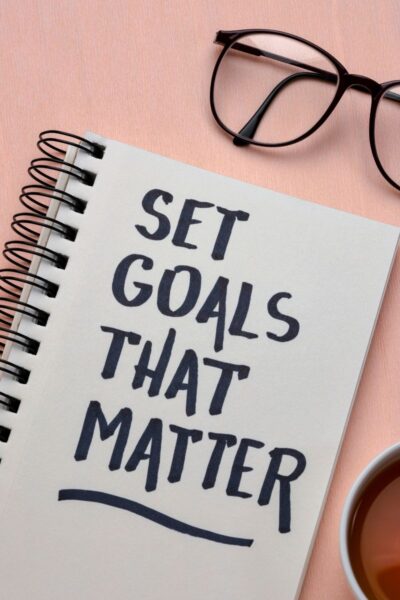
Quite often we might find ourselves at the doctor, physiotherapist or a gym because someone else has recommended that we go. This means we might not be quite sure why we are there or what we want from the encounter. we might also end up with someone else’s goal.
We might do these things because we know we ‘should’ or ‘that’s what you’re supposed to do’. Or we might do things to keep others company. We might even let other people set us goals because we don’t know how to do it.
You are more likely to succeed in a goal that comes from your own desires. So that is why we ask our clients to set goals – your goals should be more important than our goals. Even if you started off with someone else’s goal, it still pays dividends to think about how you can turn it into your own SMART goal.
Adhering too rigidly to a goal
In our enthusiasm to achieve, we might end up with another problem – sticking rigidly to our goal in the face of evidence that it is not the right goal. Goals can be flexible! Tweak your goals according to progress and in response to changes in circumstances.
How can Complete Pilates help you achieve goals?
At Complete we have the expertise to help you set and achieve goals. We are a physio-led Pilates service. Physiotherapists are trained to problem-solve. As part of your assessment we build a picture of what your physical problems are, what activities you are having difficulty with and how that is affecting your wider life.
We generate a list of treatment solutions for each of those problems (you may not realise that is what we are doing as we are talking to you – but we are!). All of this can really help to inform the goal setting process.
For example – you think you have back pain but you haven’t really thought about the impact of that other than it’s unpleasant and it hurts. We notice when we are talking to you that the wider issue is that your mood is really low and this is affecting your relationships because you haven’t been able to do your usual exercise that keeps you happy and healthy.
We reflect that back to you and you have more clarity about what you want – so your goal becomes to be able to return to cycling to work. We then will choose exercises that support your need to return to cycling – focusing on the muscles groups that need working and incorporate sitting exercises into your programme to make it relevant to cycling.
Perhaps you have already achieved your rehabilitation goals and you are looking for a new challenge? You would like to be able to perform one of our more challenging Pilates exercises but you don’t have the flexibility and strength yet. We can help you to achieve that goal by breaking down that challenging exercise into exercises that work on the different components.
For example – the Pilates “Gymnast” exercise requires a strong upper body, triceps strength, and shoulder mobility.
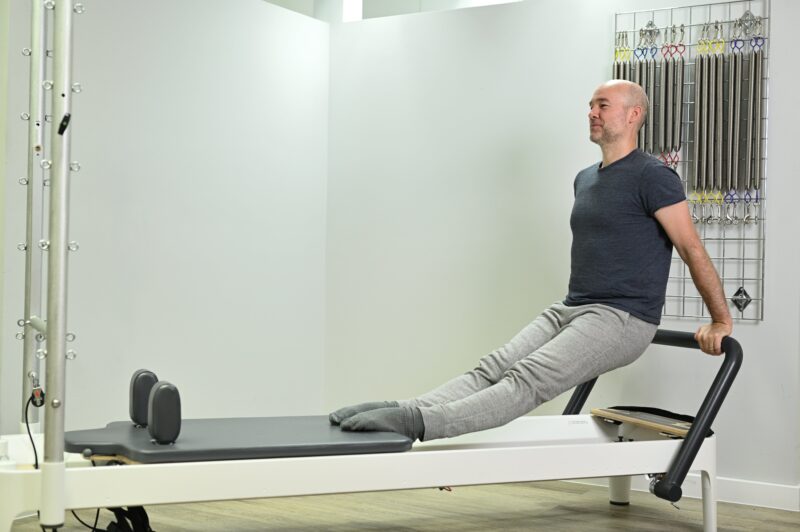
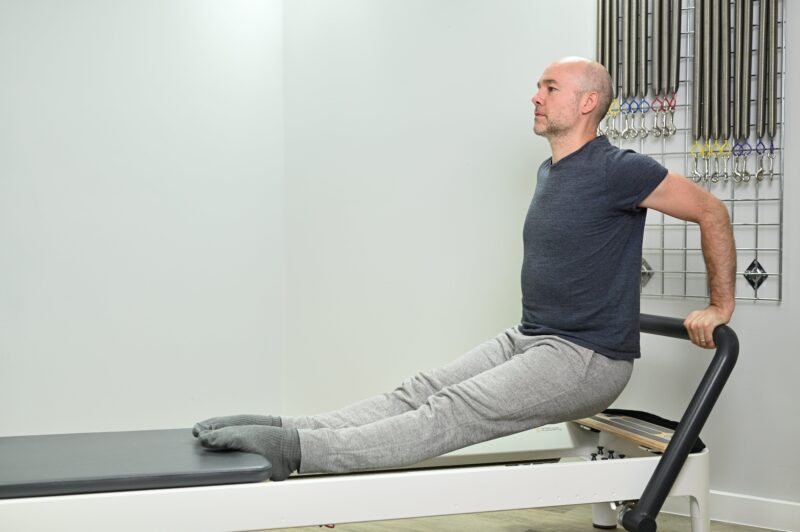
You might need to work on shoulder mobility first – using the Chair triceps press below:
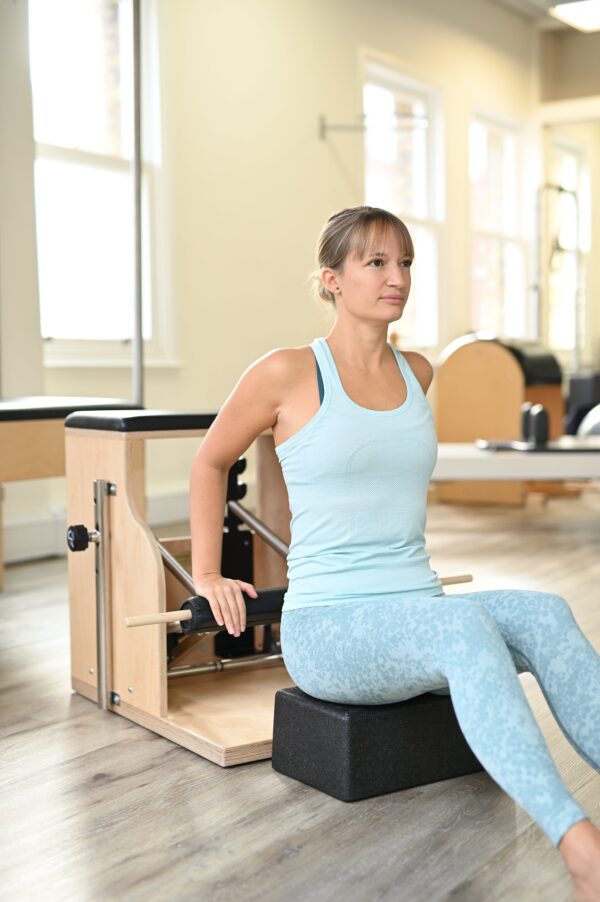
You might then progress to working on frog facing out on the Chair.
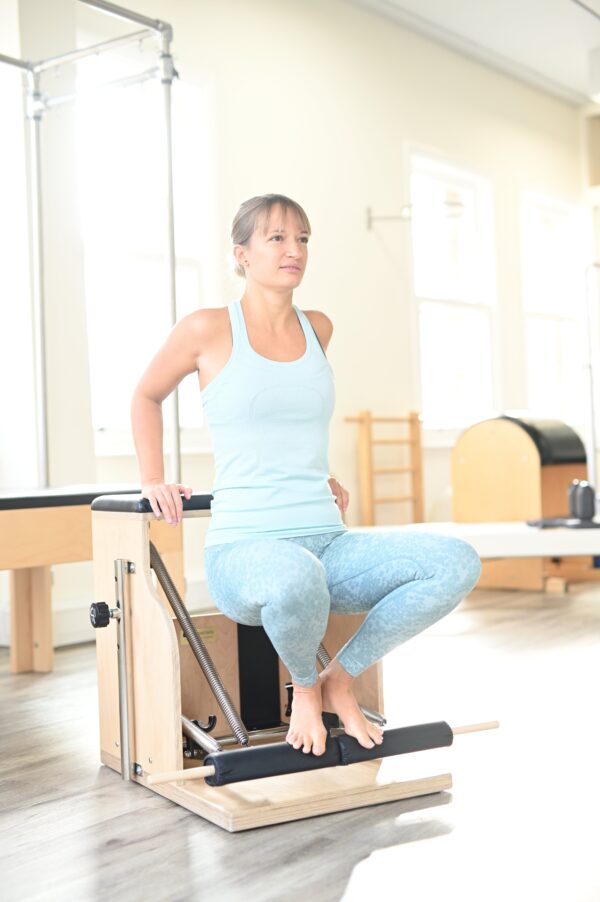
You can then gradually work towards the full Gymnast exercise.
Our team has the necessary expertise to help you work towards your goals as they understand what is needed for different exercises and can help you to work at the right level for your current ability and then progress at an appropriate speed towards your goals.
Feeling inspired? Set yourself some goals!
If you want to share your goals with us – why not complete our worksheet here.
Otherwise, find yourself a piece of paper or open a word document on your computer…
Think of up to three things that you may be having difficulty doing or aspire to be able to do.
Now, see if you can turn it into a SMART goal. Even if it is not quite SMART – having a SMARTish goal will still set you moving forward towards progress.
How will you make that goal specific, rather than general?
How will you know when you have achieved that goal – is it measurable?
Is this goal achievable or do you need to re-evaluate and choose something more manageable? Sometimes it can be difficult to know whether a goal is achievable so this is something you may need to adjust as you go – or ask for advice from an expert.
Is this goal realistic – given the time, resources and support that you have?
Is this goal time-bound – have you defined the time frame over which this goal should take place? This is an important part of committing to your goal – otherwise it may never happen!
If you haven’t already been to see us and you think we can help you with your health goals – why not drop in and see us at one of our studios, in Chelsea, Angel or City. We’d love to help!
Alternatively, contact us with any questions to find out more about how we work.
Resources
Matthews, Gail, “The Impact of Commitment, Accountability, and Written Goals on Goal Achievement” (2007). Psychology | Faculty Presentations. 3.
https://scholar.dominican.edu/psychology-faculty-conference-presentations/3
Education is key:
These blogs are designed to give information to everyone, however, it is important to remember that everyone is different! If you have not seen one of our therapists and have any questions about injuries, what you have read or whether this may be useful to you, please just ask. We are more than happy to help anyone and point you in the right direction. Our biggest belief is that education is key. The more you understand about your injury, illness and movement, the more you are likely to improve.




